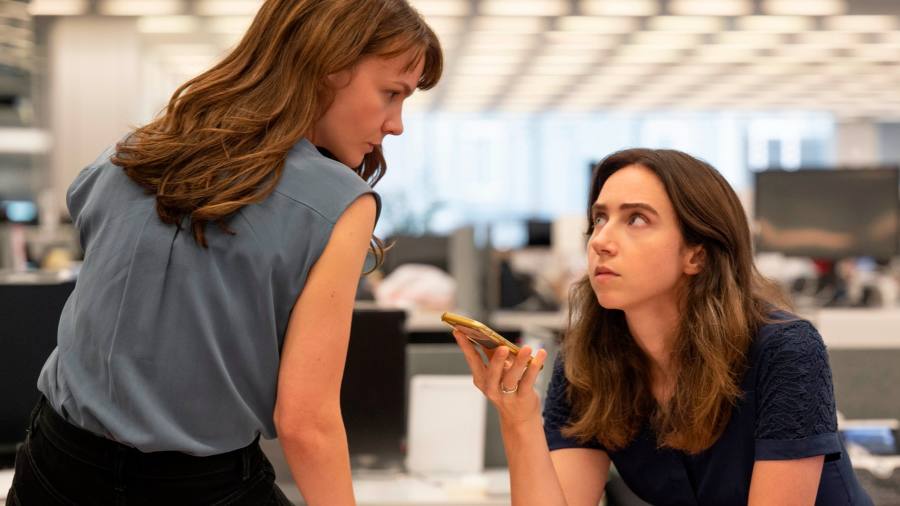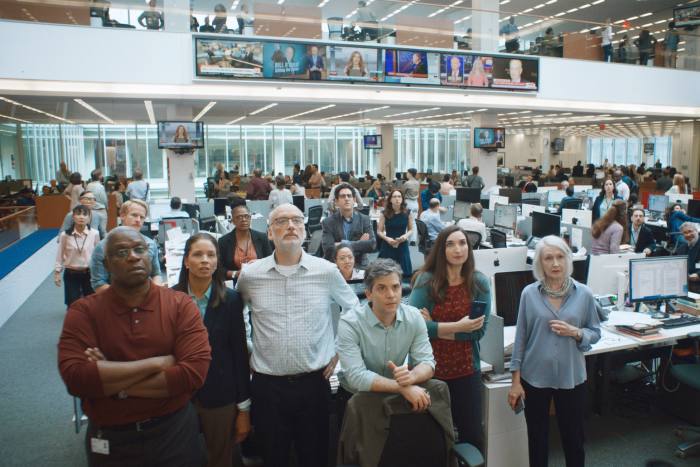
Newspapers are an old business, but they move quicker than Hollywood. So it is that She Said, an admirable film with a claim to be the year’s most important release, comes out half a decade after the news story it portrays: the 2017 exposure of Harvey Weinstein as a rapist and abuser of women. Weinstein made the American film industry a cautionary tale. The movie thus arrives with a hint of the confessional: a belated self-reckoning from the studio system.
Many of the revelations were first broken by New York Times reporters Megan Twohey and Jodi Kantor, played here by Carey Mulligan and Zoe Kazan. Their investigation of Weinstein is the crux of the story. The five years between then and now give the film the air of period piece, acknowledged with a dry sleight of hand. We open a year earlier in 2016, with Twohey doing research on a mogul suspected of mistreating women. The story fails to derail Donald Trump.
All this, we are reminded, is the very real world. Actress and whistleblower Ashley Judd plays herself, while another performer with experience of Weinstein, Samantha Morton, bristles as a former assistant. On-screen, the film is a hall of mirrors. Had they been born a little earlier, Mulligan and Kazan would have been part of the same generation of film actresses Weinstein preyed on. But a certain distance is achieved off-camera. Director Maria Schrader is German, the film her first major US studio project; the same is true of British scriptwriter Rebecca Lenkiewicz. Crucially, the movie has the feel of being at once of Hollywood and also not: a mea culpa that can sting like a j’accuse.

Adapted from Twohey and Kantor’s book of the same name, She Said spotlights the nuts and bolts of investigative journalism: sources, legwork, accurate punctuation. The portrait of the trade — diligent, punching up — will please many journalists. A cynic would have sneered when the press screening I went to ended with applause. But the movie has a frankness and clarity of purpose to defy even the edgiest troll, a sturdy pulse embodied by a coolly furious Mulligan.
Weinstein himself is all but unseen. His actions represent him instead, reported with a journalistic eye for detail. (His innocence is routinely sworn on the lives of his wife and children.) Acute too is the mapping of the dark infrastructure around his crimes. Lawyers hired to represent the women bound by his non-disclosure agreements could take 40 per cent of the pay-off. Remember the words of All The President’s Men, an earlier tale of two bloodhound reporters and another era’s scandal: follow the money.
Does nothing change? That dread suspicion might explain the film’s muted, wary tone. 2017 already seems a long time ago; much of Hollywood now clearly believes #MeToo to be past tense. Learnings learned, as the antiseptic corporate language would have it. Time will tell. For most of the women the film concerns, the industry long ago moved on without them anyway. What she said, she said. And what Weinstein did has been done.
★★★★☆
In US cinemas now and UK cinemas from November 25